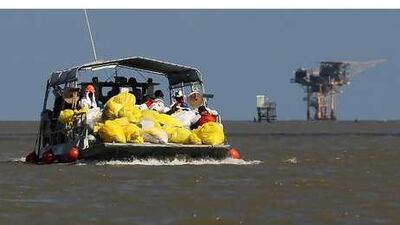The US will extend its moratorium on deepwater oil drilling, cancel plans to allow drilling off its Atlantic coast and suspend oil and gas exploration in Arctic waters, as BP struggles to plug a catastrophic oil leak in the Gulf of Mexico. Barack Obama, the president, was due to receive a report yesterday on an investigation into offshore drilling safety he had ordered after last month's blowout at BP's Macondo well triggered what may be the worst oil spill in US history.
"While the commission performs its work to determine how to prevent this from ever happening again, the moratorium on permits to drill new deepwater wells will continue for a period of six months," a White House aide told Reuters. "The lease sale off the coast of Virginia will also be cancelled due to environmental concerns and concerns raised by the defence department," the aide added. In his review of the BP well blowout and fatal rig explosion off the Louisiana coast, the US interior secretary Ken Salazar has said he would not consider applications for permits to drill in the Arctic this year, Bloomberg reported.
Mr Salazar reportedly said he wanted to allow time for further study of the drilling technology that oil companies proposed to use in Arctic waters and their oil-spill response capabilities in that environment. The US would review the application of Royal Dutch Shell to drill exploratory wells in the Arctic Ocean, he said. The interior department had conditionally approved Shell's plans to start drilling oil prospects this summer in the Chukchi and Beaufort seas off the North Slope of Alaska.
The Anglo-Dutch company had spent US$2.1 billion (Dh7.71bn) for rights to explore in the Chukchi Sea, which may hold 15 billion barrels of recoverable oil and 77 trillion cubic feet of recoverable gas resources. Shell had also planned exploration in the Canadian portion of the Beaufort Sea. Yesterday, Canada's northern native peoples called for a moratorium on offshore oil and gas drilling until better environmental safeguards were in place.
In a letter to the Canadian prime minister Stephen Harper, Mary Simon, a leader of the Inuit people, said the Gulf of Mexico spill "underscores the environmental risks and engineering challenges of offshore drilling". Risks in the offshore Arctic were "greatly compounded" by harsh climate, ice and limited infrastructure including ports, she added. A number of other large oil producers, including the Anglo-Australian firm BHP Billiton, Italy's ENI, Japan's Mitsubishi and the US companies Anadarko Petroleum and ExxonMobil have had applications for US oil drilling permit suspended in the wake of the BP oil spill. Most were planning to drill in the Gulf of Mexico.
The US interior department has so far suspended 14 applications to drill wells in shallow as well as deepwater areas, Bloomberg reported. Mr Salazar said on May 6 that no new drilling permits would be issued until the report on the BP blowout and rig explosion had been delivered to the president. On Wednesday, Mr Obama pressed for an overhaul of US energy policy and a stronger focus on renewable energy.
"The spill in the Gulf, which is just heartbreaking, only underscores the necessity of seeking alternative fuel sources," he said in Fremont, California. "Part of what is happening in the Gulf is that oil companies are drilling a mile under water before they hit ground, and a mile below that before they hit oil," he said. "With the increased risks, the increased costs, it gives you a sense of where we're going. We're not going to be able to sustain this kind of fossil fuel use. This planet can't sustain it."
BP's latest attempt to plug the oil leak, by pumping mud-like drilling fluid into the top of the well, was "proceeding to plan", Tony Hayward, the company's chief executive, said yesterday. Doug Suttles, the chief operating officer of BP, said: "We are taking great care to make sure we complete this job successfully." Oil prices climbed yesterday above $73 per barrel, rebounding from below $68 on Tuesday, for reasons unconnected to the US offshore drama.
Crude extended gains from the previous day after the Organisation for Economic Co-operation and Development raised its economic growth forecasts for euro zone and Pacific Asian countries, reviving earlier expectations that higher oil demand would mop up excess supplies. Any change in offshore drilling activity, especially in deepwater areas, would not affect oil supply for at least a decade, due to the complexity of developing deepwater discoveries.
carlisle@thenational.ae

